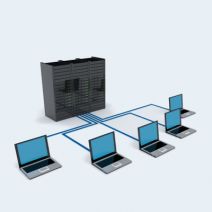How does your business use virtualization? We guarantee you that at least part of your infrastructure is virtualized to some degree, even if you don’t realize it. From hardware infrastructure to your desktop infrastructure, there are plenty of options for how your business can leverage virtualization for considerable impact.
The Connection, Inc Blog
Is your business frequently grappling with the challenges of implementing new solutions, whether software or hardware? Consider harnessing the power of virtualization in the cloud to address these issues head-on. With the right tools, virtualization can open up remarkable opportunities to enhance your business' operations while bolstering its security and flexibility.
A digital twin could arguably be seen as a somewhat niche technological innovation. Regardless, they are an invaluable resource to quite a few industries that help the businesses that use them optimize their processes. Let’s go over what a digital twin is, and how it helps a few different business types meet their needs.
Hardware is expensive, this much is certain. When a small or medium-sized business is looking to get the most bang for buck from their technology investments, they have to consider hardware to be the most crucial part of the equation. One option that businesses can take advantage of today is to use virtualized environments. Whether these computing environments are hosted onsite or in the cloud, a business can extend the usefulness of their IT budget by utilizing them. Let’s take a look at some of the benefits of virtualization on your business.
Hosting an in-house IT infrastructure may give you the reassurance that all of your servers and network equipment are being cared for properly, but it’s important to realize that your time is better spent elsewhere, like running your business. If you’re unsure if you’re providing the necessary maintenance and management for your mission-critical hardware solutions, virtualization can present a valuable opportunity.
A big part of running a successful operation is knowing how to make the most of your resources, minimizing your operating costs while still generating optimal sources of revenue and other income. One way to do so is by making the most of the hardware you currently have - such as your servers.
Let’s discuss how you can get more out of your existing servers via a process called virtualization.
Virtualization in a Nutshell
Virtualization is the use of something called virtual machines in your operations. A virtual machine is effectively what it sounds like: one of the machines that your business uses, like a computer or server, but instead of being a physical one, it’s hosted in a virtual environment.
Every computer can contribute the following resources: processing power, memory, storage space, and its networking capabilities. However, depending on the task that a given device is used for, many of these resources could potentially be put to waste, especially on a server.
If you have a line-of-business app running on your server, and you want to add another application to your network, the vendor might suggest buying a single server just to host it. There are cases where that might need to be the case, but it’s pretty likely that your current server has resources that aren’t being fully utilized for the first line-of-business app. By deploying a virtual machine on the server, it will run as if you have two servers - one for each app, but utilizing the same hardware.
What Are Some of the Benefits of Using Virtualization?
Well, the most obvious one should be the fact that, by allowing you to make the most of the computing resources you already have, you can save a hefty bit of cash on the equipment that you wouldn’t need to buy in order to support your operations.
Of course, leveraging virtualization can help you reduce some of your other costs, as well as simplify a few of the responsibilities your team members will have. Fewer servers means that there is less to power (easing your energy bills) and less to manage (allowing your time to be utilized in other ways).
However, virtualization can also assist you with your business continuity. If your onsite infrastructure is struck with a hardware failure, you can easily replicate your virtualized environment to a fresh infrastructure and resume where you left off. For similar reasons, migrating data becomes a lot easier as well.
To learn more about how you can benefit from virtualizing your business, give our professionals a call at (732) 291-5938.
On a Windows machine, look at your taskbar, near the Start button and the search function. The next little icon, the one that almost looks like a bit of film, is the Task View button, the button that (among other purposes) allows you to create and manage virtual desktops. For this week’s tip, we’ll discuss how to use this handy feature, starting with why you might want to.
What is a Virtual Desktop?
To be completely clear, this blog is referring to a very specific type of virtual desktop, which is important to state right off the bat.
Oftentimes, when we refer to “virtual desktops,” we are talking about a computing environment that is hosted in the cloud, which can be accessed from almost any device, from anywhere. Think of it like a Voice over IP (VoIP) solution, but instead of just your phone, it’s the whole computer.
Here, we’re talking about a slightly different version of that concept. Windows 10 allows its users to have multiple instances, or sessions, of Windows 10 running at the same time, via the built-in Virtual Desktop function. This has many potential uses in a business, most notably, aiding in organization while keeping different tasks and their accompanying resources separated from your other tasks and their resources. Listen to music on a streaming service while at work? Free up some valuable desktop space by accessing the service in a secondary, virtual one. Or maybe you’re a compulsive email checker - knowing that you have it open in another desktop may be enough to keep you from becoming tempted. It really is up to you to figure out how they are most useful to you.
In fairness, it really would be more accurate to call this feature “Virtual Monitor,” because it works more like adding an additional monitor setup than virtualizing a desktop... but we aren’t in charge of that kind of thing.
Working with Windows 10’s Virtual Desktops
Click on the Task View button. If your Task View button is missing, right-clicking the taskbar and selecting Show Task View button will fix that.
Alternatively, you can also open Task View by pressing Windows Key + Tab.
This will bring you to the Task View. On the bottom right, there will be a New Desktop button, which you can click to create a new, virtual desktop in addition to your original desktop. There are a few easy ways to switch back and forth between them - you can select the desktop to view from the Task View screen, use a four-fingered swiping gesture on certain touchpads and touchscreens, or a keyboard shortcut: Ctrl + Windows Key + Left/Right Arrow.
To use your programs and applications in your virtual desktops, open them as you normally would. While many apps will allow an instance in each desktop, others will pull you to the desktop that has the application running. Closing one of your virtual desktops will also cause any apps open in it to jump as well.
How do you anticipate using these virtualized desktops in your day-to-day, if at all? Let us know in the comments!
Virtualized technology services are great assets for businesses with limited budgets. Three of the best ways that your organization can take advantage of cloud computing and virtualization services are Software as a Service (SaaS), Voice over Internet Protocol (VoIP), and hardware virtualization.
Software as a Service (SaaS)
More businesses than ever are taking advantage of cloud-hosted software that’s dynamic in scope and practicality. It’s software like this that has allowed SMBs to grow and accomplish things that might not have been possible otherwise. Examples of software as a service include Microsoft Office 365 and Google’s G-Suite, but any software solution that is paid for on a monthly basis through the use of a subscription qualifies as SaaS. Since these payments are smaller than purchasing full-fledged licenses of software, SaaS is ideal for SMBs with smaller budgets.
Virtualized Telephone Solutions (VoIP)
Virtual telephony solutions are great for the express purpose that they can be used on different devices, and most Internet-connected devices can access these VoIP solutions via the cloud. This means that as long as you have a smartphone, desktop, or laptop that’s connected to the Internet, you’ll have access to your company’s telephone number.
Hardware Virtualization
Managing an entire network of servers and other components can be challenging for an organization that doesn’t have an in-house IT department. This is why many businesses are choosing to outsource their hardware management through a virtualization service. This allows for servers to be consolidated and hosted in a virtual environment, where they need less maintenance, require fewer resources to operate, and can be accessed via the cloud. Furthermore, hardware virtualization allows your organization to simplify its network.
Does your business want to take advantage of virtualization services to get the leg up on your competition? If so, reach out to The Connection, Inc. We have the technical skills and expertise required to help your business get the most out of new and innovative technology solutions. To learn more, call us at (732) 291-5938.
Your network is arguably your business’s most valuable asset. It keeps your team connected to critical information and applications that are imperative to the continued success of your company. With complex cabling, however, your workstation and network infrastructure can quickly grow uncontrollable. Isn’t there an easier way to manage your network components that can help your business grow, unhindered by physical infrastructure?
 The cloud is revolutionizing the way that businesses store and manage data, applications, and even abstracted hardware like servers and desktops. However, some businesses are still reluctant to adopt the cloud, despite its overwhelming advantages for small and medium-sized organizations. Therefore, we’re taking it upon ourselves to “demystify” the cloud, so you can see just how great of an innovation it is.
The cloud is revolutionizing the way that businesses store and manage data, applications, and even abstracted hardware like servers and desktops. However, some businesses are still reluctant to adopt the cloud, despite its overwhelming advantages for small and medium-sized organizations. Therefore, we’re taking it upon ourselves to “demystify” the cloud, so you can see just how great of an innovation it is.
 How messy is your server room? When was the last time you took note of how many machines you have, and what each of them are contributing to your business’s goals? If either of these situations sound familiar, it might be time to take a closer look at your technology and examine how you can improve operations. One of the best ways you can do so is by eliminating unnecessary costs from unused and underutilized servers.
How messy is your server room? When was the last time you took note of how many machines you have, and what each of them are contributing to your business’s goals? If either of these situations sound familiar, it might be time to take a closer look at your technology and examine how you can improve operations. One of the best ways you can do so is by eliminating unnecessary costs from unused and underutilized servers.
 Do you know the difference between virtualization and cloud computing? If you don’t, it’s not a reason to be embarrassed. Most business owners have a hard time distinguishing the two and find the topic to be rather technical. Yet, we think businesses can benefit greatly from knowing the differences so they’ll end up with the right solution.
Do you know the difference between virtualization and cloud computing? If you don’t, it’s not a reason to be embarrassed. Most business owners have a hard time distinguishing the two and find the topic to be rather technical. Yet, we think businesses can benefit greatly from knowing the differences so they’ll end up with the right solution.
 Anything that makes your business more mobile is a good thing, right? This is one of the main goals of virtualization services. These separate the software from the hardware it’s installed on, allowing it to be isolated and installed on a virtual machine where it can be accessed as an individual instance. Many businesses are finding success in their workplace by taking advantage of desktop virtualization services.
Anything that makes your business more mobile is a good thing, right? This is one of the main goals of virtualization services. These separate the software from the hardware it’s installed on, allowing it to be isolated and installed on a virtual machine where it can be accessed as an individual instance. Many businesses are finding success in their workplace by taking advantage of desktop virtualization services.












